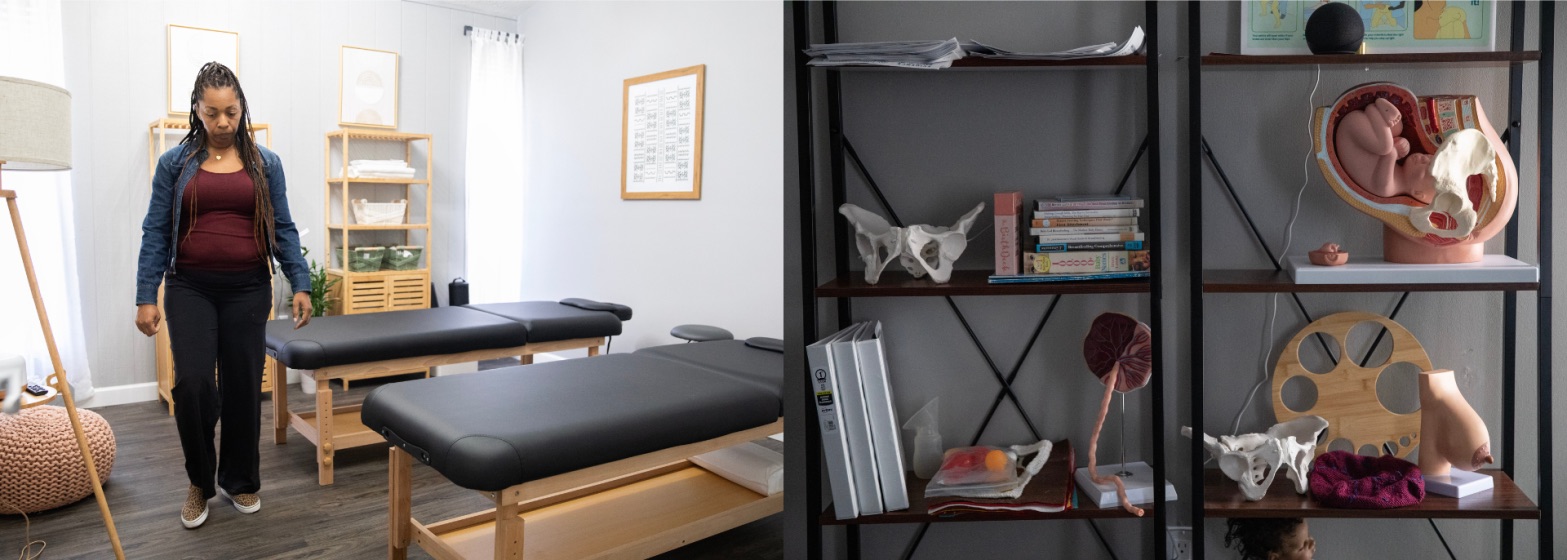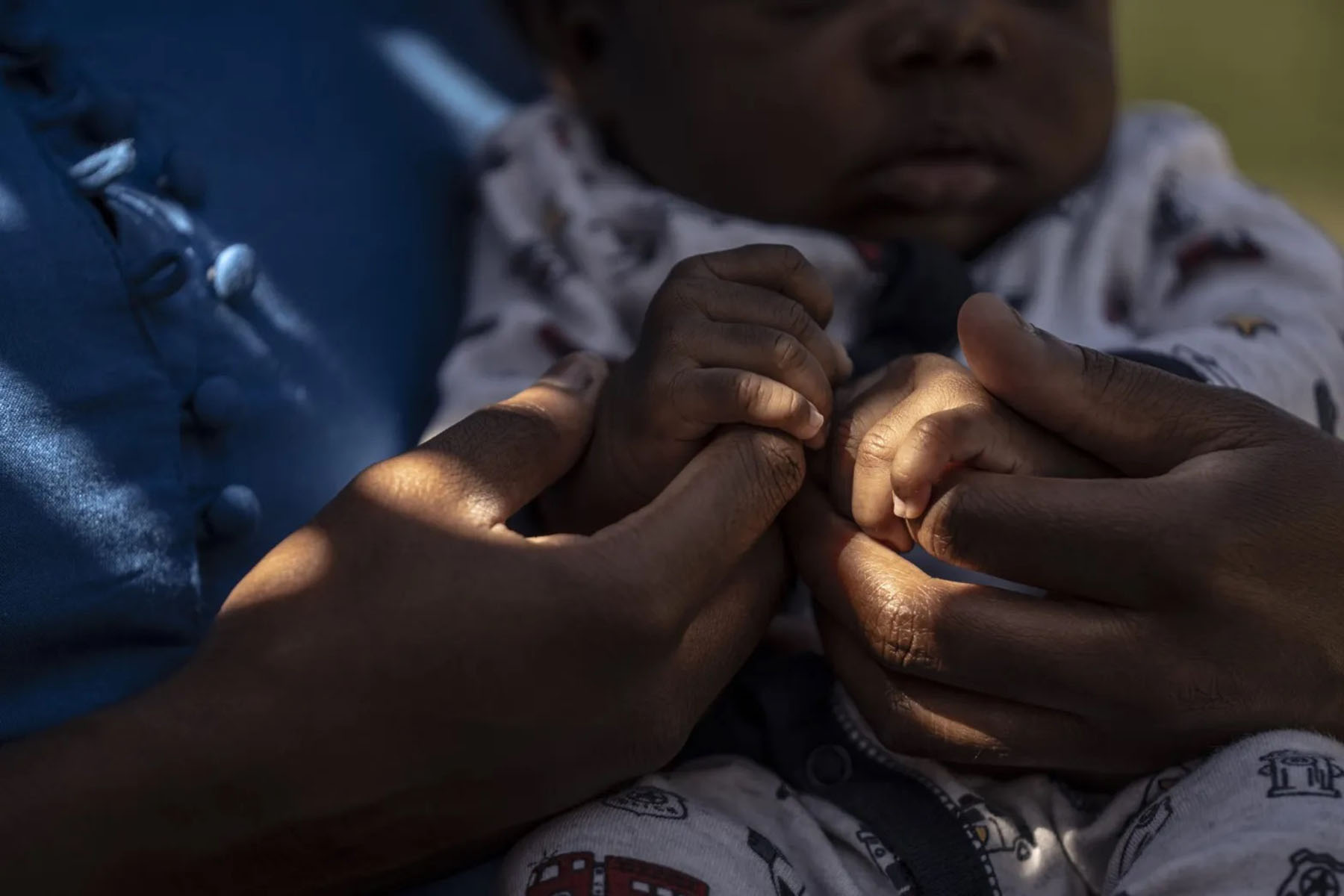This story was originally published by MLK50: Justice Through Journalism. Subscribe to their newsletter here.
When Shanille Bowens was in grade school, she started listening to her grandmother Bernice replay the sight and sound of her neighbors springing into action each time her body was ready to bear a baby.
“She had to call people to go up the hill: ‘Get the midwife,’” said Bowens, 41, a certified birth doula and midwifery student in Memphis. “It was a whole chain. That first person would tell the next person, and that person would tell the next person, and then, someone would show up with their bag.”
In small-town Okolona, Mississippi, a medical bag-toting, Black lay midwife delivered Bernice Bowens’ six healthy babies at home. Starting in 1948, she strode into motherhood in a community where she felt known and supported and where someone showed up with, say, a nourishing pot of collards after each newborn’s arrival.
By comparison, during Bowens’ 2006 pregnancy, the doctor and nurses shuttling her through a Memphis hospital’s emergency room were dispassionate. They rebuffed her and her husband’s repeated pleas to stop contractions that started three months too soon. ”I remember begging, pleading, ‘Can’t you guys do anything? … Can you try the steroids?’
“My son was stillborn. My daughter was born alive … We had to sit there and watch her pass away. It was trauma,” Bowens said, her voice breaking and eyes welling up.
Bowens’ twins became data points in Shelby County’s longstanding distinction as one of the state’s top spots for deaths among children less than a year old — Shelby and neighboring Madison County rank No. 1 in Tennessee infant deaths — and deaths among people during pregnancy or childbirth or within the medical benchmark of 42 days after pregnancy ends. Those deaths are disproportionately high for Black people.
The nation’s growing workforce of doulas is key to improving health outcomes for Black pregnant and postpartum people and babies, according to several researchers and insurers such as UnitedHealthcare. It tapped Bowens, founder of Naturally Nurtured Birth Services, Memphis’ first doula support center, as the community liaison for a pilot project gauging what happens when Memphians covered by Medicaid get a doula. Doulas, who do not provide clinical care, function as pregnancy coaches. They give clients emotional, informational and other support from pregnancy through the postpartum period; they advocate for patients during medical appointments and are a liaison between pregnant people and their doctors during labor and delivery.
It’s one of several local efforts aimed at curbing maternal and infant deaths. In July, Regional One Medical Center launched a five-year, $5 million initiative. UnitedHealthcare’s Memphis-focused project is slated to enroll 400 women by the end of 2024. Free of charge, those TennCare mothers, in addition to being paired with a doula, get access to free yoga classes, diapers, breastfeeding starter kits, nutritious food and other tangible help that can measurably boost well-being.
The pilot, which UnitedHealthcare is running in seven states, has trended toward several improvements. Compared to pregnant people not enrolled in the pilot project, project participants have shown “a 7% increase in timely prenatal visits and 14% increase in completion of the comprehensive postpartum visit,” Alexa Ryan, a UnitedHealthcare spokesperson, wrote in an email to MLK50.
“Additionally, for members who had at least three or more visits with a doula, instances of preterm birth were 50% lower and instances of low birthweight were 58% lower than those without any doula support.”
Separately, researchers at the University of California at Berkeley and Elevance Health Public Policy Institute in Washington, D.C., found that from a pool of more than 700 women receiving Medicaid, those with doulas had a 47 percent lower risk of delivering their baby by cesarean section and a 29 percent lower risk of having a preterm birth. The women were 46 percent more likely to attend a postpartum checkup, according to the study published last month in the American Journal of Public Health.
Those possibilities help inspire Bowens’ work with expectant and new mothers: “I still carry the trauma of what happened to me and my twins,” she said. “I knew, even back then, that something about this system had to be changed.”

“Doulas are not politically polarizing”
Nationwide, 12 states and the District of Columbia have expanded Medicaid so low-income people can get doula care, according to the National Health Law Program; eight more states are in the process of doing so. In Tennessee, where 44 percdent of all births are covered by Medicaid, the Tennessee Justice Center is among advocates lobbying legislators to reimburse doula care with TennCare dollars.
In 2022, Republican Gov. Bill Lee signed into law a bipartisan measure, authored by Democratic State Sen. London Lamar, ordering the state health department and TennCare officials to study and then set standards for doula certification. She hopes it will be a first step toward eventually requiring health insurers to reimburse them for their services, said Lamar, a Memphian whose first child was stillborn. Lamar had developed preeclampsia, a form of high blood pressure affecting up to 7 percent of pregnant people and a leading cause of infant and maternal death.
Initially, Lamar was concerned that the Tennessee State Assembly’s GOP majority set a 2026 deadline for the study’s completion as an attempt to “slow-walk” a measure health insurers might have opposed. Nevertheless, she is optimistic Tennessee will fall in line with what’s happening nationally. Florida and Oklahoma, which also are red states, are among the 12 already paying for doula care with Medicaid dollars. Only Rhode Island requires private insurers to cover such care.
“A whole lot of women, including ones like me, simply don’t always have the education to know what’s happening with their body,” said Lamar, who hired a doula when she later got pregnant with her now 1-year-old son. “When my bill passed, it gave me an indication that people, including Republicans, understand the importance. Doulas are not politically polarizing. We can all agree on that. They help moms and babies be healthy.”
Help for “high-priority” moms

Between 2018 and 2022, Tennessee had the highest maternal mortality rate among 38 states with enough pregnancy-related deaths to make those data reliable, according to a KFF analysis.
That fact and the real-life experiences underlying them are part of what pushed Bowens to open Naturally Nurtured Birth Services in 2018. With one Latina and 11 Black doulas, Naturally Nurtured is housed in a 3,735-square-foot building on an industrial block 3 miles from Memphis International Airport. Janitorial and building supply businesses, with loading docks for trucks, are the birth service’s nearest neighbors.
Previously a shared office space, the remodeled facility is within ZIP code 38118. By the last estimate, 71 percent of its roughly 40,000 residents were non-Hispanic Black, 17 percent were non-White Hispanic, 5 percent were White and the remainder were Asian, Native American or of some other descent. Forty percent of residents were jobless, and almost 20 percent had no health insurance. The average yearly household income was $41,830, 36 percent less than Tennessee’s statewide average of $65,524.
“Of course, we could have gone to Cordova or some other more affluent neighborhood,” Bowens said. “But we cater to Black and brown families, so we want to be where they can get to us. I don’t like to call them high-risk, but I do call them high-priority moms.”
The doulas at Naturally Nurtured have clients of various races, incomes and educational attainment. But with Black maternal deaths stubbornly high, Black moms are a main focus.
Black maternal deaths aren’t driven by economics alone; maternal death was five times more likely to occur among Black people with college degrees than their White counterparts, according to a 2019 Centers for Disease Control and Prevention report. Still, people with the least available resources have fewer factors operating in their favor.
Registered nurse and health researcher Rhonda Okoth, 41, a doula at Naturally Nurtured, spent four years at Regional One witnessing the adverse effects of poverty and lack of savvy about the medical system on many postpartum people.
“They were without so many resources,” said Okoth, who earned a master’s in public health and maternal and child health epidemiology before getting a nursing degree. “They’d get some care in the hospital, sure. But who was giving care when they went home? What if they had preeclampsia? Gestational diabetes? Hypertension that existed even prior to pregnancy? All kinds of stuff can keep you from focusing on your healing.
“Having no one at home to guide you through breastfeeding if they hadn’t done it before, that can be a problem.”
Continued Okoth, who also works at St. Jude Children’s Research Hospital, collecting data for childhood cancer researchers: “Many of these moms’ needs have nothing to do with the pregnancy. There are housing needs; there’s food insecurity.
“As a doula, you see the needs. They start opening up about things. You see that the other kids aren’t going for their annual check-ups. Mom is not getting her prenatal needs met. She’s missing visits because she can’t get time off of work … There are behaviors they might not tell their providers, but trust you with: ‘Yes, I’m still smoking weed.’ You can meet them at their fundamental point of need, make them feel cared about and loved.”
The mom-doula connection, in that way, she said, can improve outcomes.
“Someone that was there specifically for me”
Working on the maternity ward isn’t the only thing that shaped Okoth’s decision to spend a year training to be a doula. During her first pregnancy, she spent a day and a half making three separate visits to her doctor’s office before health care staffers believed, as she’d insisted, that her water had broken, even though an ultrasound didn’t show that she was fully in labor.
During the first two visits, she said, “I was sent home … The nurse told me I was urinating on myself, that it was not amniotic fluid. I was a nurse. I know I was not going crazy … The very next morning, we’re hitting on 30 hours of me being ruptured. The gold standard when someone is ruptured is to deliver in that first 24 hours to reduce the chances of infection to the baby and the birthing parent.
“When I went back to the office a third time, and saw someone different, she was shocked: ‘You are grossly ruptured.’ I could not lay back on the exam table without fluid gushing out.”
With her amniotic fluid dangerously low and the baby’s heartbeat slowing, Okoth’s labor was induced. She underwent a cesarean section. “The C-section itself isn’t traumatizing. I tell moms that,” Okoth said. “But what’s going on with your provider when you’re not being listened to, that’s a major problem.”

Memphis school teacher Jade Cooper, 32, whose second child was delivered by a midwife in August, knew those headlines. As she prepared for her first pregnancy four years ago, Cooper, a second-time doula client of Bowens, parsed data on maternal and child health outcomes, gaps in care, and related topics from entities ranging from the CDC to the World Health Organization.
“And I knew a lot of people who had negative birth experiences, an inordinate amount of cesareans, things like that. I researched how those things come about,” she said. “My husband and I weren’t convinced that the traditional route was our best option.”
Some questioned their choice of a doula and of a midwife at CHOICES Center for Reproductive Health. “‘Oh, you’re not going to be at a hospital? You’re not going to be under an OB? What if something happens?’” Cooper recalled. “ … But if you set yourself up to be mentally prepared for the battle that labor is, then, your outcomes are exponentially better. Part of my preparation was having a doula, someone that was there specifically for me and what I wanted.”
When her first baby was overdue and moving less inside her womb, the midwife induced Cooper’s labor with castor oil. Bowens was there, Cooper said. “She was the liaison between my midwife, medical providers and me. She reminded me, ‘Remember what your options are … What are your priorities? What do you want to have during this time? Do you want the lights dimmed?’ When labor really got going, and everything just hurt, everything Shanille was doing really mattered.”
Kimberly McClatchey, a mother of four whose last baby was born in August, chose a doula for her last three pregnancies. With her first child, now a 7-year-old, she went into labor prematurely while headed to a routine appointment with her doctor. Her truck-driver husband was well into a trip from Memphis to Philadelphia.
“Everything happened so fast. I was 36 weeks and three days into that first pregnancy,” said McClatchey, a participant in the UnitedHealthcare pilot project who, since that premature first birth, has become a third-time doula client of Bowens. “My mother and mother-in-law were there with me. I didn’t know I needed to breathe through the contractions, and they didn’t either, so I just held my breath.
“Having a doula helped the next go-round, and not just with the breathing. So much more goes into being in the right headspace to have a baby and a healthy pregnancy. The support my doula gave, regardless of what the issue was, showed how much she respected my decisions.”
That’s part and parcel of the teamwork good doulas strive for, said Bowens, whose Memphis facility doubles as something of a community meeting house. CPR classes are hosted there. So are training sessions on how to breastfeed and how fathers and other partners can prepare to be part of the birthing process. And baby showers and birthday parties for the children of Naturally Nurtured’s clients.
A storage room is stocked with underwear liners and other postpartum supplies; replacement breast pumps for those whose insurance doesn’t cover the costs of a second pump; sling scales for parents to weigh, say, a baby who may not be getting enough breast milk and whose pediatrician is tempted to label with “failure to thrive,” drawing the attention of child welfare workers.
A labor room at Naturally Nurtured is outfitted with a pain-relieving birth ladder, donated by a German company, for patients of midwives. Racks of baby clothes line the walls of a room not far from Bowens’ office. Her office desk is covered with applications for grants to fund what Naturally Nurtured has not been able to finance on its own. That includes the salary for a licensed mental health counselor.
Its menu of offerings and planned offerings are what attracted UnitedHealthcare to Naturally Nurtured, its spokesperson said.
“This,” Bowens said, “is heart work for us. We won’t get rich doing it. We do believe we can help change some things.”
Health and criminal justice journalist Katti Gray’s news coverage has appeared on ABC.com, CBS.com, and in The Guardian US, the Los Angeles Times, Newsday, Reuters, The Washington Post and other publications.




